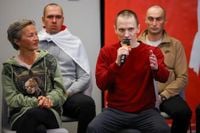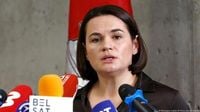On September 11, 2025, the Belarusian government released 52 political prisoners as part of a high-profile deal brokered by the United States—a move that has spurred both relief and controversy across Europe and beyond. While the agreement led to the lifting of some sanctions on Belarus’ national airline, Belavia, and was hailed as a possible first step toward thawing relations between Minsk and Washington, opposition leaders and human rights advocates have described the event as anything but a triumph for freedom.
The announcement of the release came after a rare meeting between White House special envoy John Coale and Belarus’ long-serving authoritarian leader, Aleksandr Lukashenko, in Minsk, according to reporting from AP and Euronews. The deal also coincided with a visit from US special envoy General Keith Kellogg, who was in Belarus for talks aimed at facilitating an end to the war in Ukraine. The timing and scale of the release—the largest group of pardoned political prisoners under Lukashenko—suggested a calculated diplomatic gesture, but for many, the reality on the ground was far more complex.
Among those freed were journalists, bloggers, party and union leaders, and 14 foreign nationals from Poland, Lithuania, Latvia, Germany, France, and the United Kingdom. Their journey did not end at the prison gates, however. Fifty-one of the released prisoners were swiftly transported across the border into Lithuania, where shelters in Vilnius awaited them. Many are now staying with relatives or exiled Belarusian activists, as confirmed by Lithuanian authorities and Belarusian opposition sources who spoke to Euronews.
Yet, the circumstances of their release have drawn sharp criticism. Sviatlana Tsikhanouskaya, the exiled leader of Belarus’ opposition, did not mince words at a press conference in Vilnius the following day. “Of course, we are so happy to see people free, but let’s be honest, what happened yesterday wasn’t real freedom. It was forced deportation,” she stated, as reported by AP and Reuters. Tsikhanouskaya argued that the freed prisoners were stripped of their passports and given only temporary A4-sized papers by Belarus’ security services, leaving them stateless and unable to return home.
Her senior adviser, Franak Viachorka, elaborated on the situation, telling The Associated Press, “People were counting the days and months until their release, and suddenly they are deported, separated from their families; they have no passports, and they cannot return.” Viachorka added that about half of those released were already nearing the end of their prison terms, intensifying the sense that the move was less an act of mercy and more a calculated political maneuver.
The story of veteran opposition politician Mikalai Statkevich has become emblematic of the dilemma facing Belarusian dissidents. Statkevich, a former army lieutenant colonel and presidential candidate, was among the most prominent prisoners on the release list. As the bus carrying the group approached the no-man’s land between Belarus and Lithuania, Statkevich reportedly pressed the emergency stop button and exited, refusing to accept exile from his homeland. CCTV images captured him sitting alone in the neutral zone, still dressed in his prison uniform. Lithuanian border officials and independent Belarusian sources confirmed that he later walked back toward the Belarusian side, accompanied by several Belarusian soldiers. His wife, Marina, told Euronews she had no information about his whereabouts, and as of September 13, his fate remained unknown.
Statkevich’s choice drew comparisons to Maria Kolesnikova, another opposition leader who famously tore up her passport in 2020 to avoid forced deportation, only to be sentenced to 11 years in prison. The principle at stake, Tsikhanouskaya insisted, is the right of released prisoners to decide whether to stay or leave. “Everyone who is released has the right to choose either to stay or to leave,” she said, echoing the sentiment at the heart of the opposition’s criticism.
Inside the press conference room in Vilnius, the newly freed prisoners shared harrowing stories of their incarceration. Trade union leader Aliaksandr Yarashuk, 74, described the prison system as a “torture factory for political prisoners.” He recounted, “I once almost died of cold in a punishment cell; I thought I would not survive the night.” Blogger Mikalai Dzjadok, who spent a year in solitary confinement, told reporters, “If people from the civilized world saw what a punishment cell is, they would think they were in the Middle Ages. The world simply cannot imagine the scale of what is happening in Belarus, the human rights violations, the abuse, violence of all kinds: psychological, physical, sexual.”
Some of the released prisoners expressed gratitude to US President Donald Trump for his role in brokering the deal. “I want to express my thanks,” said Dzmitry Kuchuk, another former prisoner. “If I hadn’t been pardoned, I would have remained in jail for six more years.” Yet, others voiced frustration at being forced into exile, particularly those who had been counting down the days until a normal release and reunion with their families in Belarus.
The Belarusian government has not publicly commented on the release or the allegations of forced deportation and abuse. The silence has fueled further speculation and anxiety, especially about the fate of Statkevich and others who may resist exile. Sergei Sparysh, former Secretary General of the Narodnaya Gramada party, told Euronews that he had met Statkevich shortly before the release and found him in “very good moral condition” despite poor health and a punishing 2 years and 7 months in solitary confinement. “There cannot be a nation in which there is no leader located on the territory of this country. Nelson Mandela could not be the leader of the (South) African people while being somewhere in exile. Therefore, Nikolai Statkevich stayed in Belarus,” Sparysh argued, underlining the symbolic importance of resistance from within.
According to the Viasna Human Rights Center, nearly 1,200 political prisoners remain behind bars in Belarus, a stark reminder that the recent release, while significant, is only a fraction of the total. Tsikhanouskaya has called on Western governments to pressure Lukashenko to allow political prisoners to remain in Belarus if they wish, emphasizing, “People have to have the right to stay in Belarus.”
While the release marks a notable development in Belarus’ fraught relationship with the West, it also highlights the ongoing struggle for human rights and political freedom in a country still tightly controlled by its leadership. The fate of those who remain imprisoned—and those who refuse to abandon their homeland—continues to hang in the balance.





